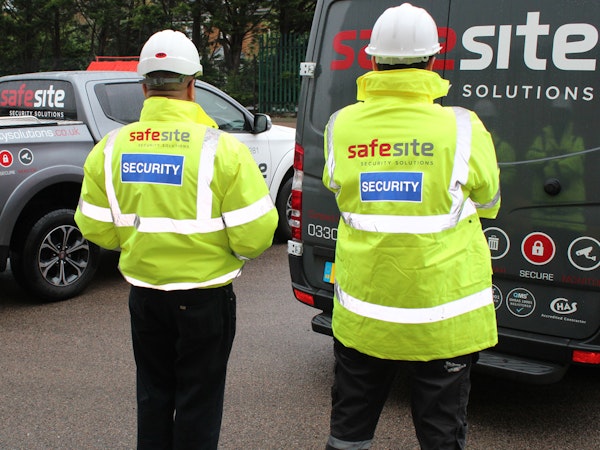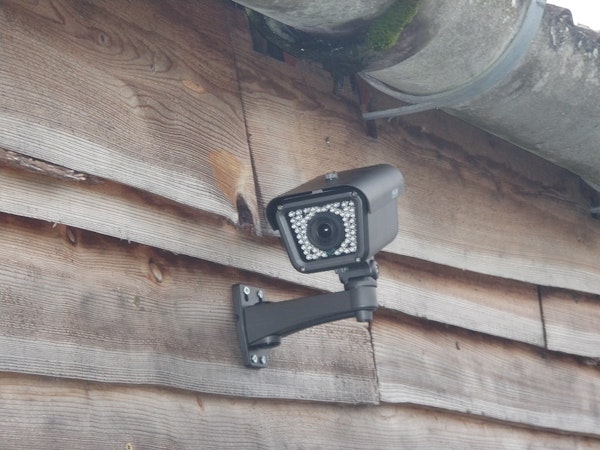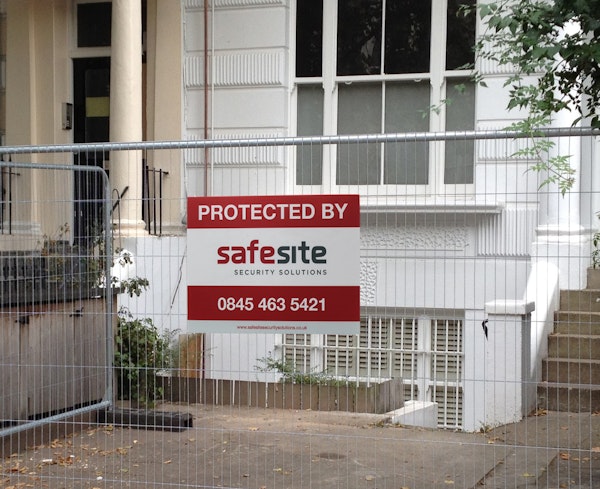- Fully qualified & insured teams
- Free site assessments
- Rapid response
- Rated Excellent
Choosing The Right Security Solution For Your Vacant Property
A property that is left unoccupied for any period of time is vulnerable to degradation, intrusion and vandalism. Fortunately, there are many ways to keep a vacant property safe and secure – from live-in guardians, to security guards, remote monitoring, fencing and boarding up.
Here, we summarise some of the pros and cons of these vacant property security methods to help you choose the right solution for your requirements.
What is a property guardian?
Commercial and public sector property owners who fear their buildings may fall into disrepair and attract trespassers can hire a property guardian who will live and sometimes even work on the premises for as long as they are needed. This is a becoming a more popular option for property owners who are in between tenants or waiting for planning permission to develop a site.
Crime such as metal theft and antisocial behaviour can be a problem for empty property owners. In recent years thieves and vandals have targeted empty buildings, ripping out boilers and pipes, and even stripping church roofs. When a guardian is in place, it can help to deter intruders and squatters.
How do you become a property guardian?
Property guardians enter into a licence agreement to live in a building, or part of it, that would otherwise be empty, with the primary aim to look after the property and keep it secure.
This agreement is usually made with the guardian company (and not directly with the property owner) and the terms will vary according to the security requirements of each property e.g. it may set out how often security alarms are checked, and when any damage or intruders should be reported.
What are the risks around property guardianship?
Property guardianship may seem like a ‘win-win’ on the face of it, especially for those seeking a cost-effective tenancy agreement and for vacant property owners looking for someone to look after their valuable asset. However, the properties that require guardianship are generally not designed for residential use. They may be commercial buildings in poor condition with limited access to facilities, or public sector buildings that are no longer in use. It may also be the case that other guardians are licensed to occupy different parts of the same building, in which case some facilities and spaces may also be shared.
Some guardianship agreements may be set for a fixed term but others may contain provision for the agreement to be terminated by the guardian company at short notice, which may not give the guardian long to find an alternative residence. Despite this, property guardians are still protected by the Protection from Eviction Act 1977 so any notice period given that is less than four weeks is likely to be deemed unlawful.
If a guardian does not leave at the end of the notice period or when the fixed term ends the guardian company or property owner must apply to the court for a possession order to lawfully remove them.
Following a change in the law that made squatting a criminal offence (in residential properties only), facilities managers say that their biggest concerns are the security of empty buildings, loss of income, complying with vacant property insurance and maintaining buildings so they are ‘ready-to-let’ immediately.
There’s no doubt that a live-in property guardian is a powerful deterrent against squatting and ‘urban exploration’ but there are other measures property owners can take to secure empty buildings and ensure they remain habitable.
When should you choose remote monitoring?
Remote monitoring will often be enough to deter trespass and criminal activity at ‘low risk’ properties. CCTV systems can be monitored either by the property owner or a hired security company, from a central control room, which means an instant response can be triggered should an issue arise.
Although traditional, wired security alarm systems are still a popular choice for vacant property owners, advances in communications technology means that wireless alarm systems can offer a host of flexible and security benefits:
- Infra-red motion sensors can detect movements over a significant area, 24/7, and alerts can be sent direct to the property owner and the security monitoring company, for immediate action. Notification alerts and reminders about battery life can also be scheduled, to minimise the risk of any system downtime.
- Remote arming, disarming and resetting options provide convenience and additional security.
- The ability to digitally record activity when the alarm is triggered means that the cause of the alert can be quickly identified and, if necessary, further action can be taken, such as notifying the police.
- Wireless home security technology offers a range of programmable options allowing a bespoke system to be set up according to the property’s precise requirements, rather than taking a ‘one size fits all’ approach.
For these reasons, a wireless alarm system can be a cost-effective alternative to CCTV, with the added benefit of offering security in ‘real time’, which is view-able from any online device, anywhere in the world.
A wireless alarm system can be used on a temporary or long-term basis and, owing to its recording capabilities, can supplement (and capture) routine patrols by security guards. Having a professional alarm system installed can also help to lower insurance premiums.
Do I need manned security patrols?
For medium to high risk vacant properties security guard services can offer 24-hour year-round peace of mind and protection. This type of security set up will usually involve two or more security guards, or teams, providing full coverage of the building from a single manned location either within the property, or its grounds. The benefit of employing security guards to monitor your premises is that you can activate an instant response to any attempted intrusion or unwanted activity.
Will security barriers and hoarding provide enough protection for my property?
Security barriers and hoarding can provide the first line of defence against intruders and trespassers, especially when properties are lying empty.
Heras Fencing is a very versatile option, which can be quickly installed, for a variety of different security situations. Hoarding fencing is largely constructed from wood and may provide a more aesthetically pleasing security solution on sites that are under development. Palisade fencing, incorporating metal stakes, offer high level security for complete perimeter protection.
Whatever vacant property services you’re looking for, always work with an industry-accredited organisation so that you can have complete peace of mind that your security arrangements are in safe hands.
Contact our fully trained and qualified team today to find out how we can help you protect your unoccupied property.
Request a free no-obligation quote
We respond in under 30 mins on average (excl. weekends)


